Should you even bother with SEO anymore? Absolutely! In 2020, the same SEO techniques and SEO hacks that used to work for 2019 are going to change, but if you are prepared for what is changing in SEO you can dominate the future of marketing by playing smart.
In this SEO tutorial video, Eric Siu shares how to grow website traffic in 2020 and some new SEO strategies for on page SEO, SERP domination, and more! 2020 is not just about voice search and podcasting, the marketing tactics that will really move the needle are the omnichannel marketing strategies.
If you want the best growth hacks for 2020 and to master the future of SEO, be sure to subscribe to our channel for more great videos.
Oh, and if you are wondering, what is SEO in the first place – it’s search engine optimization and we have a bunch of great videos on SEO for beginners on the channel.
——
►Get marketing training and join our exclusive marketing Slack group:
►Start and grow your own agency:
►Follow Eric on Instagram:
————
Want to learn the SEO tactics that AirBnB, Lyft, and Heineken use to drive millions of site visits a month? Download the case study now:
Leave some feedback:
What should I talk about next? Please let me know on Twitter – or in the comments below.
Enjoyed this episode? Let me know your thoughts in the comments, and please be sure to subscribe.
Connect with Eric Siu:
Growth Everywhere Podcast –
Marketing School Podcast – …
Single Grain – Digital Marketing Agency –
Twitter
►Subscribe to my Channel:
Video Transcript:
In this clip, we’re going to talk about how SEO is going to change in 2020 and unfortunately you’re not going to like it, but before we do, don’t forget to subscribe or follow whatever platform you are watching on right now, especially if you enjoy a clips on marketing, entrepreneurship, growth, productivity, and more stuff. You’re going to enjoy it. Check it out. All right, so SEO, here’s what’s happening with SEO right now. If you think about Google, because Google is the largest, they take on the lion’s share of the traffic in the U S and a lot of countries around the world. The problem with this is they’re a publicly traded company. Now their incentives are to make more money for their shareholders. Now it’s no longer just don’t be evil, which was their model in the past. They actually took that off of kind of their, their mission statement or part of their mission and values.
So you think about it now, there’s only so much space. There’s only so much real estate and on a search result page. So it used to be in the past, you know their ads. I remember in high school when, when they started, um, Google ad words, um, the, there was only like one snippet and as crystal clear that it was an ad, right? And now over over the years, now it’s becoming less and less apparent that it’s an ad, right? It used to be highlighted in yellow. It was like crystal clear as an ad and there’s only like one or two of them right now you might see like four or five ads at the very top and you see more ads at the bottom because Google is making a less apparent than their ads and they’re putting more ads on the, on the on search engine result pages, they’re making more money, they’re incentivized to make money, which means the organic results, the SEO results, those are getting pinched down a little bit, right?
So what used to be at the very top above the fold that would get like the lion’s share of the clicks. Now it’s getting pushed down so much that you know these to say like maybe the number one result in SEO might get 25 to 40 to 50% of, of the clicks. Now it’s like, you know, it might go down to like 10% or so. There’s a clip I’m going to show you in a little bit where, uh, when I spoke at the marketing school live conference, I’m, I actually share some data, uh, from, from rand Fishkin, from spark Toro, the search result pages, they’re getting more and more consolidated as become a tougher and tougher to, um, to make SEO work.
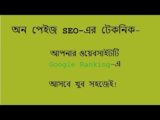
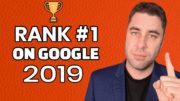









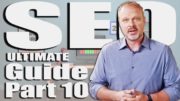
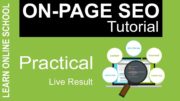

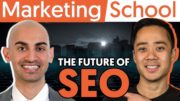
What do you think about the future of SEO? Are you a fan? Are you nervous? Let us know in the comments!
So whats the alternate measure to increase the organic traffic? are we going to rely only on paid ads?
Great question. Organic traffic is still going to be very important, you’ll just have to compete harder for it. The best way to do this is through building your brand power online through multiple channels. Increase your organic ranking through steady content upgrades, backlinks and quality content – that part will always be there. Paid ads will of course help, but remember it will continue to get more expensive and you’ll need to build a defense of your organic marketing as well. Keep building momentum and you’ll still be able to defend your organic traffic.
So if not seo do you suggest paid ads? How does a beginner succeed?
Great video, I can do the same for blogs. Like adding keywords and upgrading the content. What do you suggest for service or product pages that has less content?
@Maximillian Heth that’s one valuable comment.
Amazing, thank you for the advice here. Yes if you have the time for something like this at the beginning it can work because not as many people are willing to put in the work.
Very good question. SEO is still important – it is just not as EASY to rank organically. Alternatively, Paid Ads alone will get more and more expensive, and will be difficult to rely exclusively on.
One of the best suggestions is to still focus on SEO, but focus on building your brand across multiple touch points and channels.
Short answer, as a beginner, you’ll have to be prepared to start in one channel, and as soon as possible, begin to go omni channel.
You could post on forums, get active on social media, write guest posts, etc — just jump in and provide value to people who are curious about your niche. The more help and value you give to people, the more you’ll stand out. You don’t have to jump into ads right off the bat, though Facebook boost posts are an excellent, easy, and relatively cheap way to drive paid traffic to your site, which can also help your SEO as well. Another thing to consider is targeting long-tail keywords as opposed to medium or short-tail keywords since long-tail keywords tend to feature less ads (they aren’t as attractive to advertisers since they don’t drive gargantuan amounts of traffic individually), but, when you rank for a lot of long-tail keywords, the numbers can add up pretty quickly. This case study is kind of old, but I think it’s still pretty relevant, especially considering what’s coming around the bend: . You’ll notice that the guy says that he combined paid ads with targeting long-tail keywords, so it’s not too far off from what Eric’s suggesting.
It’s true we are getting pinched organically, however, there are other opportunities. It’s also important to understand what are most of the zero clicks. Yes, there is a zero-click increase as people continue to depend on Google by asking what is the weather?, the time? and traffic updates?. Yet, much (not all) is stuff we are not going to produce webpages or write blog posts about.
When people say SEO is dead, I respond, SEO is dead when people stop using search engines and search engines stop ranking content in a specific order. There is always a reason why one website, image or video ranks above another. It’s up to the SEO to figure out why and how to improve (yes, a multi-channel approach).
Thanks for sharing snippets of the conference!
Well said as usual Rosh! Thanks for tuning in – glad that you enjoyed the conference clips in this one.
Right, You can definitely measure the zero click data based on the keywords you’re targeting to help focus your efforts so you’re not writing about the weather.